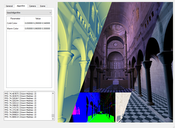Information
- Publication Type: Bachelor Thesis
- Workgroup(s)/Project(s):
- Date: January 2021
- Date (Start): 20. September 2017
- Date (End): 31. January 2020
- Matrikelnummer: 01426483
- First Supervisor:
Abstract
If someone were in need of a real-time global illumination algorithm regarding their specific requirements, they would have no issue finding many possible options nowadays. There are many algorithms that are unmatched in realism, interactivity or performance. However, it might be challenging to compare different approaches side by side.In this thesis, a framework is proposed that is capable of building a foundation for the comparison of real-time global illumination algorithms. This framework depends on an unified handling of various algorithms while aiming to be nonrestrictive towards them. All modules of the application are designed to be as mutable, generic, extendable, and reusable as possible to avoid the reimplementation of similar concepts. A consistent concept is integrated into the framework to provide a great amount of configurability, even at runtime.
Additional Files and Images
Weblinks
BibTeX
@bachelorsthesis{klein-2020-rtgi,
title = "A Framework For Real-Time Global Illumination Algorithms",
author = "Markus Klein",
year = "2021",
abstract = "If someone were in need of a real-time global illumination
algorithm regarding their specific requirements, they would
have no issue finding many possible options nowadays. There
are many algorithms that are unmatched in realism,
interactivity or performance. However, it might be
challenging to compare different approaches side by side.
In this thesis, a framework is proposed that is capable of
building a foundation for the comparison of real-time global
illumination algorithms. This framework depends on an
unified handling of various algorithms while aiming to be
nonrestrictive towards them. All modules of the application
are designed to be as mutable, generic, extendable, and
reusable as possible to avoid the reimplementation of
similar concepts. A consistent concept is integrated into
the framework to provide a great amount of configurability,
even at runtime.",
month = jan,
address = "Favoritenstrasse 9-11/E193-02, A-1040 Vienna, Austria",
school = "Research Unit of Computer Graphics, Institute of Visual
Computing and Human-Centered Technology, Faculty of
Informatics, TU Wien ",
URL = "https://www.cg.tuwien.ac.at/research/publications/2021/klein-2020-rtgi/",
}
 thesis
thesis

